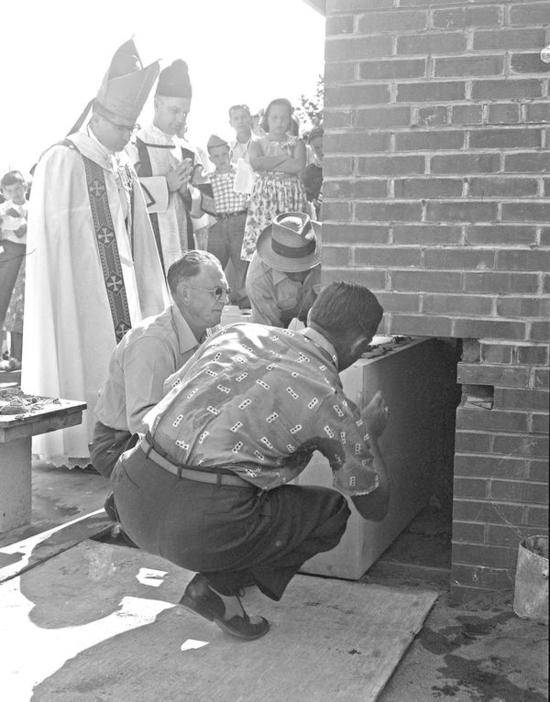Downloads
Full view (jpeg: 96.7 KB)
Learn more about copyright and access restrictions for use of materials from Worthington Memory.
Photograph of Cornerstone and Time Capsule Installation at St. Michael's School, 1954 is a picture, with genre photograph and group portraits.
It was created on Sunday, June 20, 1954.
Albin (A. V.) Vineyard Shirk, 1938- is the Photographer.
This black and white photograph commemorates the installation of a cornerstone and time capsule at the Saint Michael parish school on Sunday, June 20, 1954, during the final months of building construction. Two church officials look on as three men seat the cornerstone below the building. The ceremony was attended by a crowd, and several children and an adult are visible looking on in the background.
The ceremony included a procession of clergy and parishioners, a flag raising and singing of the national anthem, followed by the placement of photos, newspaper clippings and other documents inside the stone before it was sealed and blessed. Edward G. Hettinger, auxiliary bishop of the Catholic diocese of Columbus, then gave an address before the group of visiting clergy and St. Michael’s parishioners returned to the congregation’s worship space for a closing service.
The new $272,000 school building located on Selby Boulevard opened to students in the fall of 1954 with 11 classrooms, a cafeteria, and a kitchen. And just in time, as the post-war baby boom could be seen in enrollment growth: 49 children attended St. Michael’s school’s makeshift quarters in the so-called "Chase mansion" in 1946. By 1953, 196 students were enrolled. St Michael’s students would have been studying in make-do spaces for eight years before students and staff finally obtained a dedicated "school building."
In 1954, the St. Michael’s parish campus would have looked much different from today.
The parish was established in early 1946 by Bishop Ready, though it took another six months until the Catholic diocese found a suitable permanent site at the southwestern edge of the Colonial Hills subdivision, on the northeast corner of Selby Boulevard and High Street.
In June 1946 the congregation purchased eight acres of the former Bishop Chase farm. The "Chase mansion," a large frame house, which by then had been altered quite extensively over the past century, still stood on the property. As the main structure on the St. Michael’s site, it was refurbished yet again with converted classrooms, a rectory, and space for Sunday Mass.
The old house on the new St. Michael’s site may have been the original home of Kenyon College. Kenyon’s founder, Reverend Philander Chase, came to Worthington in 1817 to take the reins of Worthington Academy and serve as the first ordained minister of St. John’s Episcopal Church. At that time, he purchased a 150-acre farm just south of Worthington. Intent on creating a seminary for new ministers to spread the gospel in the wilderness, the Ohio Episcopal Diocese ultimately settled on acreage in Knox County for the new school, though Chase had offered his farm as a suitable site. Chase and his family left Worthington for Gambier, Ohio, and the new Kenyon College in 1828. But in the previous decade young men and boys had studied and boarded in what Chase referred to as the "mansion house" on his farm.
Within two years of the parish’s arrival, St. Michael’s congregation and its school had completely outgrown the Chase mansion. In July 1948 the parish moved to its new church, described by the "Columbus Evening Dispatch" as a 40 X 160-foot Quonset hut, near the old house. The building would serve as a church, school, and parish hall until the current school building opened in 1954. Construction of the large Romanesque-style basilica Saint Michael’s church was completed in 1964. The landmark Chase mansion was demolished in 1967. It had served as a convent for the nuns who taught at the school during the old home's final years.
It covers the topics church buildings, private schools and Catholic Church.
It features the organization St. Michael School.
It covers the city Worthington. It covers the area Colonial Hills.
The original is in a private collection.
This file was reformatted digital in the format video/jpeg.
The Worthington Memory identification code is wcd0363.
This metadata record was human prepared by Worthington Libraries on November 11, 2021. It was last updated December 2, 2021.

